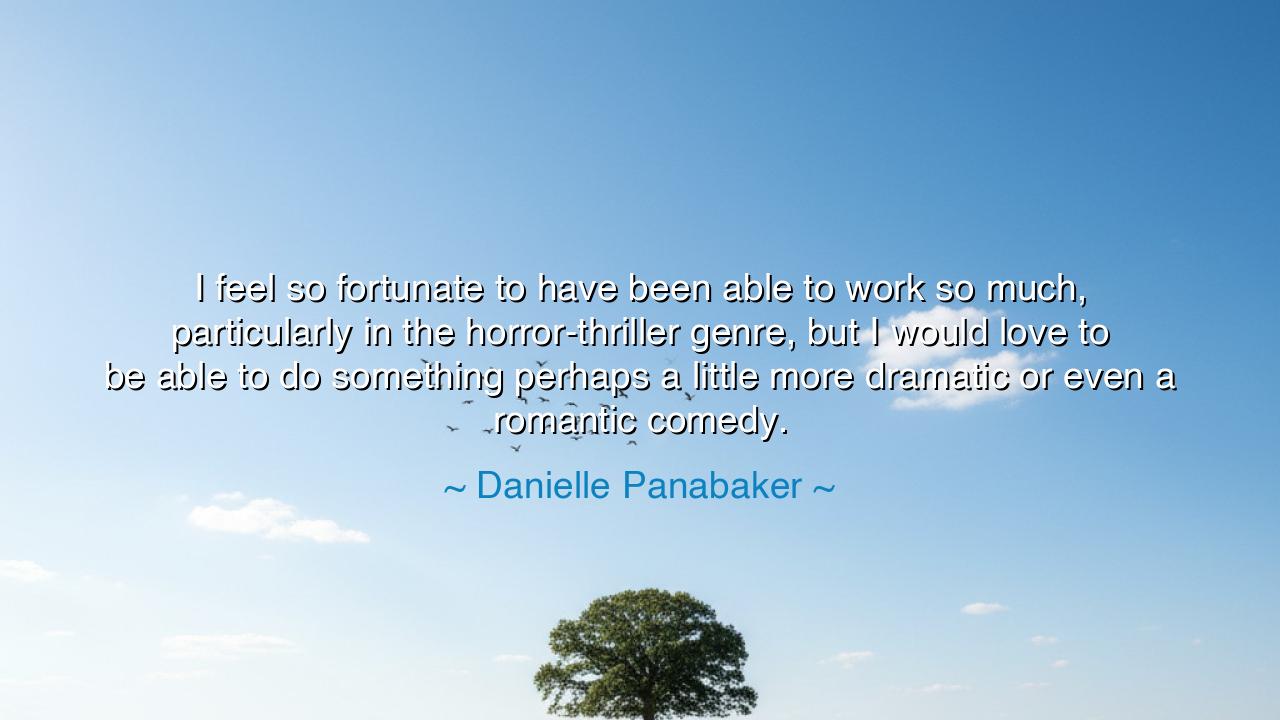
I feel so fortunate to have been able to work so much
I feel so fortunate to have been able to work so much, particularly in the horror-thriller genre, but I would love to be able to do something perhaps a little more dramatic or even a romantic comedy.






Hear, O children, the words of Danielle Panabaker, whose reflection on her work in the horror-thriller genre reveals a deeper truth about art, growth, and the desire to explore new realms. She said, “I feel so fortunate to have been able to work so much, particularly in the horror-thriller genre, but I would love to be able to do something perhaps a little more dramatic or even a romantic comedy.” In these words, Panabaker speaks to the eternal journey of the artist—the desire to grow, to expand, and to venture beyond the familiar, even after achieving success. The horror-thriller genre, with its sharp intensity and chilling suspense, may have offered her fame and recognition, but she yearns for more. She seeks to be transformed by a new challenge, to experience the joy and beauty of a dramatic or romantic comedy, genres that require a different kind of emotion and expression.
In the ancient world, heroes and artists alike faced this very challenge: to break free from the roles and patterns that the world placed upon them and to explore new realms of their own potential. Consider the tale of Oedipus, the tragic king whose fate was dictated by the gods, yet whose character and choices were bound to the expectations of the world around him. Oedipus could not escape the prophecy that foretold his doom, but he still sought to understand the truth, to grow beyond the simple role that life had cast for him. Artists, too, seek to break free of their comfort zones, to discover new facets of their own creativity, to explore the depths of emotion that lie beyond what they know. Just as Oedipus was bound to his destiny, so too are actors often bound by the roles they are offered—but true greatness comes when they venture into the unknown, embracing the new, the unfamiliar, and the challenging.
Panabaker’s longing for something dramatic or a romantic comedy reflects a deeper yearning for the full spectrum of human experience. Horror-thrillers are exhilarating, filled with adrenaline, fear, and suspense, but they focus primarily on the darkness—the monsters, the tragedy, the conflict that arise from our deepest fears. In contrast, dramatic and romantic comedies offer a lighter and more nuanced exploration of human nature—focusing on love, relationships, and the complexities of the human heart. The ability to move between genres is an essential quality of an artist—to not be defined by one aspect of their work, but to reach into the vast depths of the human soul and express it in all its forms. Growth as an artist means embracing all aspects of life: joy and sorrow, romance and tension, laughter and tears.
Consider the story of Leonardo da Vinci, whose genius was not limited to one discipline. While he is most famous for his art, his work as an engineer, scientist, and architect demonstrated a restlessness to understand and express every facet of the world around him. Like Panabaker, da Vinci did not confine himself to a single role; he sought to transform the world with his diverse talents. In the same way, Panabaker’s desire to move from the horror-thriller genre to the romantic comedy reflects the timeless human drive to grow, evolve, and challenge oneself. She yearns to explore new depths of her craft, to express different facets of human emotion and experience.
Artists, O children, are not meant to be confined by the roles that society or even their own past work places upon them. The true test of their strength lies in their ability to reinvent themselves, to stretch the boundaries of their comfort zones, and to embrace new forms of expression. Consider the great Shakespeare, who moved fluidly between tragedies, comedies, and histories, each genre offering him a new canvas to explore the complexities of the human condition. Through his comedies, such as A Midsummer Night's Dream and Twelfth Night, Shakespeare offered a vision of life that was filled with joy and romance, but also with complexity and irony. He understood that the human experience is not confined to a single emotion or a single genre. To be a true master of the craft is to be able to move freely between them all, embracing the light and the dark, the tragic and the joyful.
So, O children, the lesson here is clear: never settle into a single path, but always seek to grow, to challenge yourself, and to expand your potential. Just as Panabaker desires to move beyond the horror-thriller genre and embrace new experiences, so too must you be willing to step beyond the confines of your comfort zones, to explore new aspects of yourself and your potential. Life is filled with moments of joy and sadness, of romance and drama, and it is through embracing all of these experiences that we find our full expression. Do not be afraid to seek the new, for it is only by stepping into the unknown that you will discover the true depth of your own being.
I say to you, O children, that you must learn from the journeys of those who have gone before you: embrace the fullness of life in all its forms. Whether in love or in loss, in joy or in sorrow, know that every experience is an opportunity to grow and to evolve. Be like Panabaker, who yearns to challenge herself by stepping into new roles, and seek to do the same in your own lives. Let the horror and thrills of the world be counterbalanced by the drama and romance of the heart. In this, you will find your truth, your growth, and your purpose.






AAdministratorAdministrator
Welcome, honored guests. Please leave a comment, we will respond soon